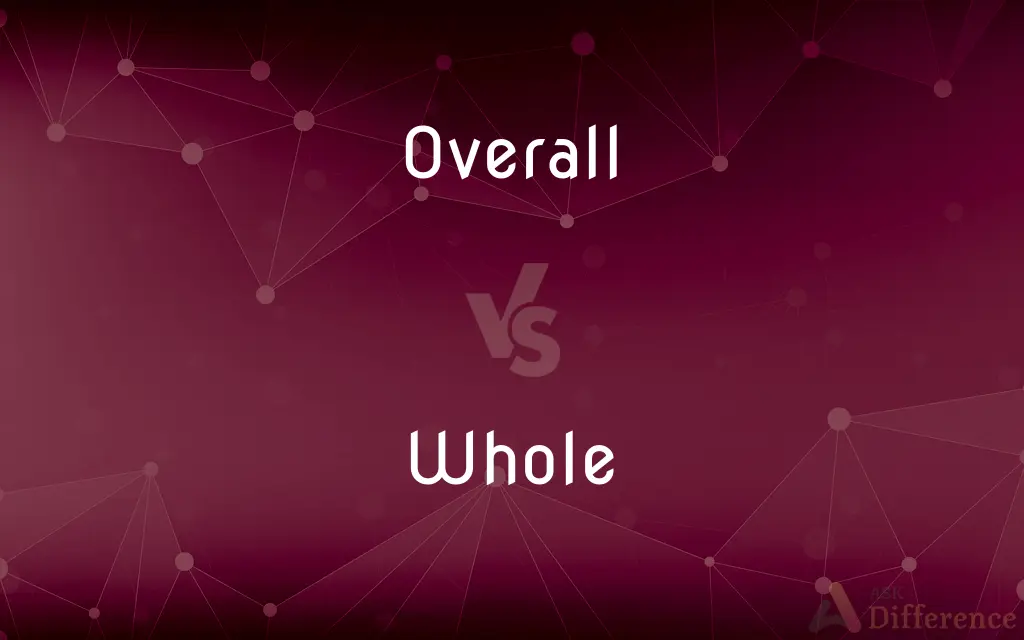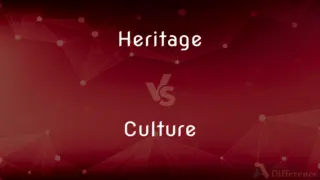Overall vs. Whole — What's the Difference?
Edited by Tayyaba Rehman — By Urooj Arif — Updated on April 5, 2024
Overall focuses on completeness from a broader perspective, while Whole emphasizes total unity or intactness.

Difference Between Overall and Whole
Table of Contents
ADVERTISEMENT
Key Differences
Overall refers to taking everything into account, often used to describe a general effect, sum, or impression. It signifies a holistic view where all parts are considered together, typically in terms of coverage, effectiveness, or assessment. For instance, when discussing a project, one might say the overall progress has been satisfactory, indicating a cumulative consideration.
Whole, on the other hand, stresses the unity and intactness of something. It implies that all components or elements are present, forming a complete, undivided unit. In the context of an object or concept, stating it is whole suggests nothing is missing or broken. For example, when examining an artifact, confirming it is whole means all original parts are intact.
While "overall" can apply to abstract concepts, such as feelings or impressions, "whole" is more concrete, relating directly to the physical or complete presence of something. Overall happiness might refer to a general sense of well-being despite some life areas needing improvement, whereas a whole piece of art indicates no part of it is missing or damaged.
In usage, "overall" often introduces a summary or conclusion, reflecting on all aspects of a situation. It's about the aggregate effect or outcome of various components. Conversely, "whole" focuses on the state or condition of a single entity, emphasizing its completeness or entirety.
The term "overall" can also imply a coverage or inclusivity, suggesting that no part has been overlooked. For instance, overall performance in a tournament would consider all games played. "Whole," however, is used to assure that something is undiluted or unbroken, like saying a vase has remained whole after a move.
ADVERTISEMENT
Comparison Chart
Focus
Broad perspective, coverage
Unity, intactness
Usage
Abstract concepts, general effect
Physical presence, completeness
Context
Summaries, overall impressions
Condition of being undamaged or complete
Implication
Inclusivity, considering all parts together
Entirety, no part missing or broken
Example Sentence
The overall results were positive.
The artifact was found to be whole.
Compare with Definitions
Overall
From a general perspective, without focusing on specifics.
Overall, the trip was enjoyable despite the minor setbacks.
Whole
Referring to something that is intact or unblemished.
The integrity of the structure remained whole after the earthquake.
Overall
As a summary of the main points.
Overall, the meeting addressed the key issues facing the team.
Whole
Unbroken, undamaged.
The seal on the document remained whole.
Overall
Considering everything as a whole; in total.
The overall cost exceeded our initial budget.
Whole
In an unaltered or undivided state.
The community stood as a whole against the new policy.
Overall
Encompassing all parts or aspects.
Her overall performance this semester has been impressive.
Whole
All of; total.
She spent the whole day reading her new book.
Overall
Pertaining to a total or aggregate figure.
The overall score determines the winner of the competition.
Whole
Entire, complete, not missing any parts.
We managed to keep the vase whole during the move.
Overall
Taking everything into account
The governors and head have overall responsibility for managing the school
The overall effect is impressive
Whole
Containing all components; complete
The whole series of novels.
Overall
Taken as a whole; in all
Overall, 10,000 jobs will go
Whole
Not divided or disjoined; in one unit
A whole loaf.
Overall
A loose-fitting coat or one-piece garment worn over ordinary clothes for protection against dirt or heavy wear
A pair of overalls
Men in grubby blue overalls
Whole
Constituting the full amount, extent, or duration
The baby cried the whole trip home.
Overall
From one end to the other
The overall length of the house.
Whole
Not wounded, injured, or impaired; sound or unhurt
Many escaped the fire frightened but whole.
Overall
Including everything; comprehensive
The overall costs of medical care.
Whole
Having been restored; healed
After the treatment he felt whole.
Overall
Regarded as a whole; general
My overall impression was favorable.
Whole
Having the same parents
A whole sister.
Overall
On the whole; generally
Enjoyed the performance overall.
Whole
A number, group, set, or thing lacking no part or element; a complete thing.
Overall
Chiefly British A loose-fitting protective outer garment; a smock.
Whole
An entity or system made up of interrelated parts
The value of the whole was greater than the sum of its parts.
Overall
Overalls Loose-fitting pants, usually of strong fabric, with a bib front and shoulder straps, often worn over regular clothing as protection from dirt.
Whole
Entirely; wholly
A whole new idea.
Overall
All-encompassing, all around.
Whole
Entire, undivided.
I ate a whole fish.
Overall
Generally; with everything considered.
Whole
Used as an intensifier.
I brought a whole lot of balloons for the party.
She ate a whole bunch of french fries.
Overall
(British) A garment worn over other clothing to protect it; a coverall or boiler suit. A garment, for manual labor or for casual wear, often made of a single piece of fabric, with long legs and a bib upper, supported from the shoulders with straps, and having several large pockets and loops for carrying tools.
Whole
Sound, uninjured, healthy.
He is of whole mind, but the same cannot be said about his physical state.
Overall
A garment, worn for manual labor, with an integral covering extending to the chest, supported by straps.
Whole
(of food) From which none of its constituents has been removed.
Whole wheat; whole milk
Overall
Everywhere.
Whole
(mining) As yet unworked.
Overall
Work clothing consisting of denim trousers (usually with a bib and shoulder straps)
Whole
(colloquial) In entirety; entirely; wholly.
I ate a fish whole!
Overall
A loose protective coverall or smock worn over ordinary clothing for dirty work
Whole
Something complete, without any parts missing.
This variety of fascinating details didn't fall together into an enjoyable, coherent whole.
Overall
Involving only main features;
The overall pattern of his life
Whole
An entirety.
Overall
Including everything;
The overall cost
The total amount owed
Whole
Containing the total amount, number, etc.; comprising all the parts; free from deficiency; all; total; entire; as, the whole earth; the whole solar system; the whole army; the whole nation.
The whole race of mankind.
Whole
Complete; entire; not defective or imperfect; not broken or fractured; unimpaired; uninjured; integral; as, a whole orange; the egg is whole; the vessel is whole.
My life is yet whole in me.
Whole
Possessing, or being in a state of, heath and soundness; healthy; sound; well.
[She] findeth there her friends hole and sound.
They that be whole need not a physician.
When Sir Lancelot's deadly hurt was whole.
All the whole army stood agazed on him.
One entire and perfect chrysolite.
Lest total darkness should by night regainHer old possession, and extinguish life.
So absolute she seems,And in herself complete.
Whole
The entire thing; the entire assemblage of parts; totality; all of a thing, without defect or exception; a thing complete in itself.
"This not the whole of life to live,Nor all of death to die.
Whole
A regular combination of parts; a system.
Parts answering parts shall slide into a whole.
Whole
All of something including all its component elements or parts;
Europe considered as a whole
The whole of American literature
Whole
An assemblage of parts that is regarded as a single entity;
How big is that part compared to the whole?
The team is a unit
Whole
Including all components without exception; being one unit or constituting the full amount or extent or duration; complete;
Gave his whole attention
A whole wardrobe for the tropics
The whole hog
A whole week
The baby cried the whole trip home
A whole loaf of bread
Whole
(of siblings) having the same parents;
Whole brothers and sisters
Whole
Exhibiting or restored to vigorous good health;
Hale and hearty
Whole in mind and body
A whole person again
Whole
To a complete degree or to the full or entire extent (`whole' is often used informally for `wholly');
He was wholly convinced
Entirely satisfied with the meal
It was completely different from what we expected
Was completely at fault
A totally new situation
The directions were all wrong
It was not altogether her fault
An altogether new approach
A whole new idea
Common Curiosities
How is "whole" used differently from "overall"?
"Whole" emphasizes complete unity or intactness, while "overall" focuses on a general or cumulative perspective.
What does "overall" mean in a sentence?
"Overall" refers to considering all aspects or the general effect of something.
Is "overall" more abstract than "whole"?
Yes, "overall" is often used in more abstract contexts, while "whole" usually refers to concrete completeness.
Can "overall" apply to individual components?
Not typically; it's used to refer to the sum or general effect of multiple components.
Can "overall" and "whole" be used interchangeably?
No, because "overall" refers to a broad, inclusive perspective, whereas "whole" emphasizes total completeness.
How does the use of "overall" affect the perception of performance or results?
It offers a generalized view that can smooth over specific details, focusing on the cumulative outcome.
Why is "whole" important in describing objects?
It indicates that an object is complete, undamaged, and retains all its parts.
What does it mean when something is described as "whole"?
It means the thing is complete, with no parts missing or damaged.
How does "overall" impact the understanding of a situation?
It provides a summative perspective, considering all parts or aspects together for a general assessment.
In what contexts is "whole" preferred over "overall"?
When emphasizing the completeness or intactness of something specific.
How does the term "whole" relate to the concept of integrity?
It often conveys that the integrity of an object or concept remains undamaged or unbroken.
Does "overall" imply a conclusion?
Yes, it often introduces a summary or conclusive assessment based on all aspects considered.
Is "whole" limited to physical objects?
Primarily, though it can also refer to concepts of unity or completeness in a non-physical sense.
Why might someone prefer to use "overall" in an analysis?
To give a summarized view that encompasses all elements, providing a holistic assessment.
Can "overall" suggest a broad coverage?
Yes, it implies inclusivity and a comprehensive consideration of all parts or aspects.
Share Your Discovery

Previous Comparison
Beautiful vs. Hot
Next Comparison
Heritage vs. CultureAuthor Spotlight
Written by
Urooj ArifUrooj is a skilled content writer at Ask Difference, known for her exceptional ability to simplify complex topics into engaging and informative content. With a passion for research and a flair for clear, concise writing, she consistently delivers articles that resonate with our diverse audience.
Edited by
Tayyaba RehmanTayyaba Rehman is a distinguished writer, currently serving as a primary contributor to askdifference.com. As a researcher in semantics and etymology, Tayyaba's passion for the complexity of languages and their distinctions has found a perfect home on the platform. Tayyaba delves into the intricacies of language, distinguishing between commonly confused words and phrases, thereby providing clarity for readers worldwide.














































